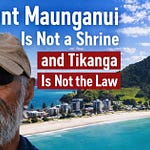Credit to @2ETEKA for exposing what’s really happening behind the curtain.
The B416 group presents itself as a concerned, progressive initiative to protect children from the harms of social media. But dig a little deeper, and you’ll find a well-connected network of elites using the cover of youth safety to push through invasive digital surveillance, biometric ID systems, and a profitable regulatory ecosystem.
Thanks to the investigative work of @2ETEKA, the hidden financial motives and ideological agendas driving B416 are finally being exposed.
B416's real plan: Digital ID, biometric tracking, and government surveillance
In a recent interview with Simon Bridges, Malindi McLean, a leading voice of B416 and ironically a social media entrepreneur herself, admitted the group supports implementing biometric digital ID systems to enforce social media bans for under-16s.
Her messaging is clear: "This is not a parenting issue, it's a government issue." That alone should raise alarms. The proposed system would require users to be scanned by biometric apps that verify age by tying personal data to a digital identity token, verified through third-party “verification providers.” Every website visited, every like or comment, would be recorded.
Despite McLean's claim that “no one is taking your data,” the system she’s endorsing depends entirely on persistent data collection and surveillance.
Global failure, local import
Efforts to restrict online access using ID-based verification have already failed in multiple countries. France, for example, has tried twice to implement similar controls but has now conceded that only biometric digital ID at the EU level will make enforcement possible.
The only nations where such controls fully function are China and North Korea, where VPNs are banned and total state control is the norm. Is that the model B416 wants New Zealand to follow?
A who's who of conflicted interests
Virtually every key figure involved in B416 has ties to the digital ID, age verification, or data regulation industries.
Anna Curzon, for example, was hand-picked by former PM Jacinda Ardern to lead a digital governance body. She's now a public supporter of B416, pushing for the same framework that would make biometric ID compulsory.
KiwiBank CEO Steve Jurkovich also chimed in with praise for B416 via LinkedIn, lauding Curzon’s leadership. This is notable, considering how a digital ID system would make it far easier for banks to “debank” customers based on their political views.
The deeper you look, the more financial motives you uncover. From banks to government-linked advisory boards, B416 is not grassroots. It is astroturf.
SafeSurfer and the $500 million question
One of the more alarming developments is B416's partnership with Samsung to promote so-called SafeSurfer phones, locked-down devices children would be required to use to access the internet. These phones are expected to retail around $229 each.
Holy Jean Brooker, a prominent B416 advocate, is currently touring schools to promote the devices. The plan, apparently, is for the government to eventually ban minors from using any other phones, forcing parents to buy the “approved” devices.
With over two million children in the country, this policy could push families toward spending nearly half a billion dollars to comply. Who benefits from this? Investors like Stephen Tindall, one of the major backers of SafeSurfer and a key supporter of B416.
Disturbing ideologies behind the curtain
It doesn’t end with phones and surveillance. One figure linked to the group, reportedly a “sex therapist,” has raised eyebrows with deeply disturbing child education ideas, including encouraging naked conversations about porn with children. These are not isolated radicals. These are people shaping policy and influencing education under B416’s umbrella.
What are they hiding?
Another suspicious move? The government quietly took down its Digital Framework website on February 25. That platform previously outlined their plans for digital ID systems and even central bank digital currencies (CBDCs). Why erase it now, when these technologies are suddenly being promoted by advocacy groups like B416?
Time for accountability
Prime Minister Christopher Luxon has remained quiet on B416 despite the growing public backlash on X. If National aligns with this group (which they already have), or even refuses to condemn its overreach, it could be politically disastrous.
Massive thanks to @2ETEKA for cutting through the noise and laying bare the connections, agendas, and financial incentives that power B416. This is just the beginning. The public deserves full transparency and real opposition to creeping digital authoritarianism.















